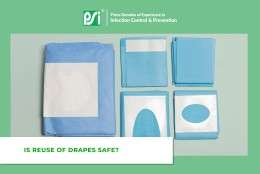One of the best Surgical Disposables company. I am dealing with them for the past 5 years,
their products are world-class. Their approach to trade is professional. All the best wishes to
them.
How to Use the Angiography Drape? A Complete Guide - PSIDispo
- By: PSIDispo
yfbf.jpg)
Angiography drapes are used to keep the surgical site sterile and avoid suture material contamination. Once the patient is ready and seated on the surgical platform, drapes are placed on them.
Draping materials come in three varieties: disposable paper drapes, disposable plastic adhesive drapes, and reusable cloth drapes. When using disposable surgical angiography drapes, the surgeon may cut any size or shape fenestration or aperture in the drape. There will be an unfixable hole in a cloth drape.
Visit Now: Reinforced Surgical Gown
Although adhesive drapes come in transparent and opaque varieties, for a minor procedure, clear drapes are preferable since they allow for clear patient visibility. Some drapes combine paper and plastic adhesive so that the paper can better delineate the sterile zone while the plastic can be placed straight over the surgical site.
Now that we know what a disposable angiography surgical drape is and what it looks like, we can learn how to utilize one for angiography.
What Is An Angiography Drape?
PSIDispo angiography drapes are designed to manage infection effectively. The drapes include a transparent side panel that allows you to view the instruments you're working with, and they're easy to use. They are composed of an absorbent, impermeable material to keep the working area dry and protect the patient.
(2).jpg)
What Is a Draping Procedure?
Draping a surgical patient's body primarily separates the surgical site from the rest of the patient's body and non-sterile areas of the operating room table, lowering the chance of surgical site infection, also referred to as SSI.
How to Use an Angiography Drape?
Four adhesive fenestrations on the patient's radial or femoral side make this drape multifunctional.
Step 1: Remove the fenestration release paper from one or both fenestrations and orient the drape with the patient.
Step 2: Position the drape so that the selected fenestrations are appropriately aligned in relation to the radial and femoral access points. A drape should be placed on the lower chest or upper abdomen for radial access; line the radial fenestration with the radial access and then apply it to the prepared area.
Step 3: Lay the drape out, starting on the side and working your way up to the head.
Step 4: Once the patient is covered, unfold toward the feet.
Step 5: Complete the draping by firmly sealing the fenestration's edges to the patient's skin.
Step 6: Both sides include transparent windows that enable seeing and using the controls.
Final Verdict
To ensure everyone's safety during diagnostic and interventional treatments that use a lot of fluid, it's essential to have easy access for patients, a way to regulate fluid flow, and complete coverage. With all PSIDispo angiography drapes providing performance, safety, and convenience to address the unique demands of various procedures, you now have more options than ever!
One of the best companies to partner with. Very responsive and best product quality.
Good experience and corporation for many years. Timely services are provided.
We have been associated with PSI since more than 20 years now. They have superior products, prompt service & courteous people. Using PSI’s products in turn makes our customer happy and helps us to do more business. Overall truly delighted with their customer service.














_iCEz.jpeg)
 +91-7798800781
+91-7798800781
newf.jpg)





